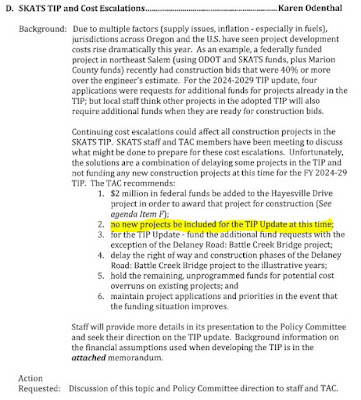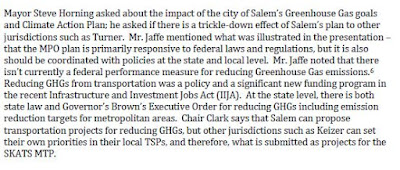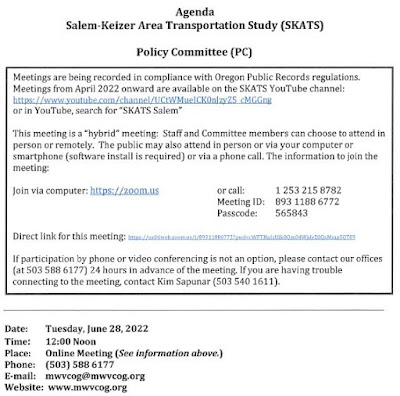The Policy Committee for our Metropolitan Planning Organization meets on Tuesday the 28th, and it looks like they are hitting pause on the 2024-2029 funding cycle.
 |
| Big impacts from cost escalation |
The latest recommendation for coping with escalating costs is simply to stop the process for funding new projects temporarily. This is a bit of a surprise. Given the messed up supply chains and inflationary pressures, and all the hand-wavey other Pandemic disruptions, this is not shocking, but the step of not just cancelling some, but pausing all, is surprising. It is only a temporary measure for now.
Earlier this month at the technical committee, the discussion of a possible Citizen Advisory Committee elicited local examples of other advisory committees. The City of Salem give an interestingly biased story. They cited "the city's current Traffic CAC." That would be the Citizens Advisory Traffic Commission. "[I]t has been a challenge to provide consistent meaningful work" to the committee, the City said.
 |
| A biased view of CATC |
But that is entirely by design! There are all kinds of useful tasks the City could give to CATC, but the City usually just assigns them squabbles over parking removal. Here is the agenda from November 2021. Item 4 is a typical parking "problem" or disagreement.
 |
| November 2021 CATC agenda |
But the follow-up note suggests the City could have charged CATC with
recommendations on reducing emissions from driving and reducing driving
more generally. That's a substantial project the City could have assigned them.
Instead, the City formally uses CATC in very limited ways, does not see them as a source of critique or analysis, and avoids asking them interesting questions. They play it very safe and direct comment is very carefully channeled and controlled, on very small, delimited questions.
Any challenge to providing CATC with meaningful work is because that's the way the City wants it, not because of other limitations. The City wants a powerless, non-influential committee.
 |
| SF Chronicle today, hinting at our future also |
At the previous PC meeting, Turner and Keizer both said that they didn't want "a trickle down effect of Salem's [climate] plan to other jurisdictions." Don't tell me what to do!
 |
| On climate: "Don't tell me what to do" |
But if we are going to make progress, the MPO should not let small cities undermine the progress for the urban area. This is a little like our current housing debates, in which it has become clear that balkanized local control undermines housing supply and state action is necessary for increasing housing. (Or locations where anti-vax and anti-mask sentiment provide pockets for new variants to incubate and spread.) Since transportation emissions occur in travel that often crosses municipal boundaries, it is reasonable for the MPO to support Salem's climate action and to want to develop a stronger and more unified approach to the whole urbanized area.
 |
| Front page earlier this month |
As a way to combine action on climate and increased citizen involvement, the MPO should consider a panel composed solely of youth. If we are developing population, employment, and traffic forecasts for 20 and 30 years out, we should consider the opinions of those who will be leaders and in the prime of life then.
 |
| Meeting information |
The Policy Committee meets Tuesday the 28th at noon. The agenda and meeting packet can be downloaded here.


No comments:
Post a Comment